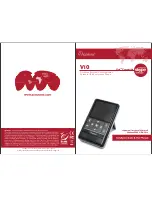
20
Getting started
Components
The basic building units of Chinese
characters are components that are
made up of strokes. After entering
the first two strokes of the desired
character, the component and character
candidates that started with that stroke
are displayed in the candidate row.
Using components is a fast method
for entering complex characters.
For example, to enter “
信息
”
1 Enter “ ”, “ ” and “ ”.
2 Move the cursor to
“
信
”, press
.
Move the cursor to “
息
”, press
again to select “
息
”.
Example of using the wild card key
The wild card key
, is used to
supplement unclear strokes in entering
characters. If you want to enter “
互
”,
but you only know that “
一
” is the first
and the last stroke of the character
and that the total number of strokes
is four, enter
,
,
,
. The
character is displayed in the candidate
row.
Over-Down
口 已 户
书 骨
Over-Down-
Hook
力 习 也
同 永
Over-
Left Slope
又 之 登
多 社
Over-Down-
Over-
Left Slope
及 极 廷
建
Over-
Left Slope-
Curved-
Hook
阿 队 陈
那 部
Over-Down-
Over-Hook
乃 透 鼐
隽 杨
Over-Down-
Over-Down
凸
Curved-
Hook
狗 豹 家
逐 狂
Over-Down-
Curved-
Hook
乙 九 瓦
飞 风
Over-Down-
Over
投 沿 船
凹
Over-Down-
Lift
话 计 认
讯
? (Wild card key)
Number
Key
Stroke
Category
Basic
Stroke
Stroke
Name
Character
The smaller candidates surrounded by
dotted frames are components, and the
bigger candidates without dotted frames
are characters.
This is the Internet version of the User's guide. © Print only for private use.
















































